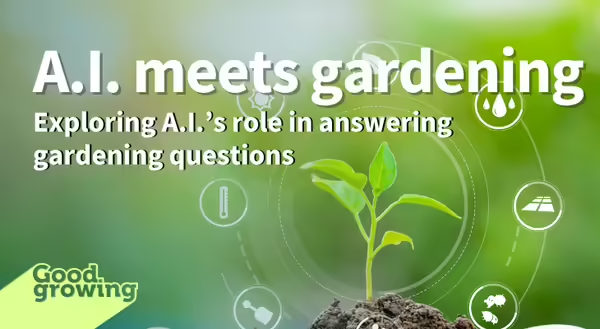
You may be wondering, “What does artificial intelligence (A.I.) have to do with gardening?” Let’s say you have a gardening question. Before the internet, perhaps you reached out to your Illinois Extension office for an answer. With the internet, you could search for your question but had to wade through lots of different sources. Again, your local Extension office is there to help narrow down to reputable information in an ocean of data.
Today we can type our question into a generative A.I. interface and an answer is given to us. Without doing an exhaustive online search, checking references, or reading multiple sources to confirm the information is indeed sound.
I wanted to test some generative A.I. platforms to see if they returned accurate information to common gardening questions. I would say in nearly every instance, the results were mixed. For example, I asked multiple generative A.I. tools (ChatGPT, Google Bard, Microsoft CoPilot, etc.), “Can you recommend eco-friendly lawn care practices?” From this question, I received a list of sustainable lawn care practices. Let’s examine the section of these responses regarding fertilizer:
- All of the generative A.I. tools replied to use organic fertilizers for eco-friendly lawns as these are better for the soil and plants.
- A few A.I. tools said to select fertilizers with nitrogen, phosphorous, and potassium as our plants need these nutrients.
- Only one recommended a soil test.
Soil testing and fertilizers
Now if you’ve ever listened to an Extension professional talk about fertilizer, we probably use the words “soil test” at least ten times. Soil testing is a huge asset when determining what to add to our soils. Putting amendments in our soil without a test is like playing darts in the dark.
Do we need fertilizers with nitrogen, phosphorous, and potassium?
When it comes to nutrients and our lawns, nitrogen is likely the only nutrient we need to consider when calculating how much to buy and apply. Notably, phosphorous is a potent pollutant and quite detrimental to our water quality. Therefore, an eco-friendly lawn would omit fertilizers containing phosphorous, unless a soil test revealed a deficiency, which is unlikely for Illinois soils when it comes to both phosphorus and potassium. None of the A.I. tools caught these details.
Is organic fertilizer better for plants?
Organic fertilizer can provide additional resources to our soil that synthetic products do not. Yet, when it comes to nitrogen (the nutrient we focus on when it comes to lawns), our plants cannot tell whether the source is organic or synthetic. Therefore, organic fertilizer is not “better for plants.” I will give A.I. half credit in this case as we can see improvements in soil health. (Some of you may be yelling at me now that soil health relates to plant health. There is certainly truth there, but in terms of plant performance the source of nitrogen does not matter.)
The bottom line on A.I. as a resource for gardening information (as of winter 2024)
What are my thoughts when it comes to using generative A.I. for gardening questions? Right off the bat, whatever answer is supplied you still need to reference the sources. Some A.I. responses were more of a product advertisement than an unbiased response. Generative A.I. scrapes the internet for information and it doesn’t seem to distinguish between science-based information and commercial advertisements. For instance, one A.I. tool suggested I order ladybugs for my organic lawn care. It even listed several reasons ladybugs are a good idea. When I checked the source of this, it came from a company that sells ladybugs to gardeners. By the way, Illinois Extension does not recommend buying and releasing ladybugs in a home landscape. Releasing ladybug in an enclosed greenhouse? Maybe.
You can use additional prompts to try and narrow the results to research-based articles or to check sources. However, I am assuming (wrongly or rightly?) that many people will not specifically seek out research-based answers and will go with whatever makes them feel best.
I also felt there was a big thing missing, the human. Despite the ease of achieving an answer to our question using A.I., a human is still necessary with this new technology to parse out useful information from the unnecessary. Or perhaps a better way to describe it is that the human still needs to translate how the information applies to your unique situation. And that’s why Illinois Extension is still here to help our community members make informed decisions.
Good Growing Tip of the Week: Nitrogen is also a troublesome water pollutant, and it can readily move into our water systems. When fertilizing a lawn in spring it is recommended to apply early to mid-May for Central Illinois. Often homeowners and companies apply fertilizer too early in spring.
Sign up for our emails! Want to get notified when new Good Growing posts are available? SIGN ME UP
Give us feedback! How helpful was this information (click one): Very helpful | Somewhat helpful | Not very helpful
MEET THE AUTHOR
Chris Enroth is a horticulture educator with University of Illinois Extension, serving Henderson, McDonough, Knox, and Warren counties since 2012. Chris provides horticulture programming with an emphasis on the home gardener, landscape maintenance personnel, and commercial landscapers. Additional responsibilities include coordinating local county Master Gardener and Master Naturalist volunteers - providing their training, continuing education, advanced training, seasonal events, and organizing community outreach programs for horticulture and conservation assistance/education. In his spare time, Chris enjoys the outdoors, lounging in the garden among the flowers (weeds to most).